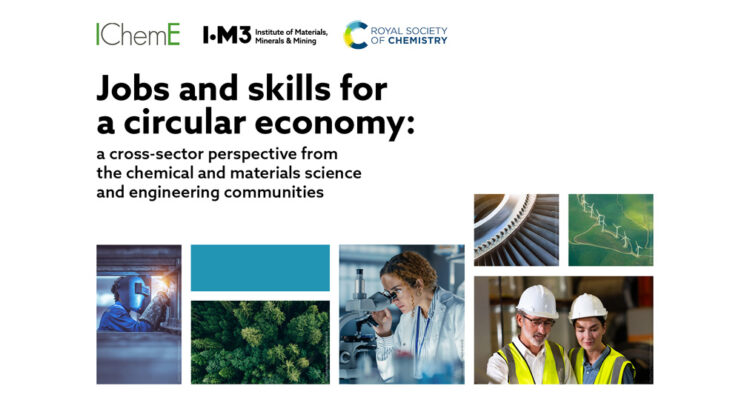
The Institute of Materials, Mineral & Mining (IOM3) has joined with the Institution of Chemical Engineers (IChemE) and the Royal Society of Chemistry (RSC) to publish a report highlighting the UK’s skills gaps and the challenges that the nation faces in developing the workforce required to deliver a successful circular economy, as well as setting out steps to address those challenges.
The report draws on insights from across industry, academia, education and training providers, and policymakers, and calls for recognition of the fundamental role that chemical and materials science and engineering play in realising the opportunities offered by greater circularity, including securing growth and building supply chain resilience.
‘This report is informed by a broad and diverse community across our disciplines,’ said Rachel Stonehouse, head of policy at IOM3. ‘It brings together insights from a range of actors and sectors, and clearly demonstrates that delivering the workforce to drive the circular transition is a cross-economy priority and pressing risk facing the UK.
‘Essential for the UK’s long-term economic and environmental resilience, the shift to a low-carbon, circular economy relies fundamentally on chemical and materials science and engineering,’ she continued. ‘As professional bodies, we will continue to support our communities to lead the transition and to help build the partnerships needed to deliver the skilled, inclusive and adaptable circular economy workforce the UK urgently requires.’
‘This government is committed to building a circular economy where we keep resources in use for longer and reduce waste,’ said the Department for Environment, Food and Rural Affair. ‘This transition will accelerate our path to net zero, drive vital investment in green infrastructure and jobs, boost our economy and help nature flourish. Getting our workforce equipped with the right skills will be absolutely critical to making this transformation a success.’
The UK currently consumes 15.3 tonnes of materials per person each year – roughly double what is considered sustainable – with more than 90 per cent of those materials lost to the economy when they’re discarded. Transitioning away from this linear approach to materials consumption to a circular economy is a pressing imperative, but this can only be achieved with the right jobs and skills.
The new report highlights the need for long-term policy certainty and stability to support industry investment and individual career choices. It also calls for better awareness of job opportunities, stronger support for the skills pipeline by tackling barriers to education and increasing workforce diversity, an effective approach to regulation, planning and permitting, and greater alignment between government strategies.
The report, ‘Jobs and skills for a circular economy: A cross-sector perspective from the chemical and materials science and engineering communities’, is based on insights from two online workshops with 47 expert stakeholders across industry, academia, education and training providers, and policymakers, and a survey with 54 participants.
The report can be downloaded here.


